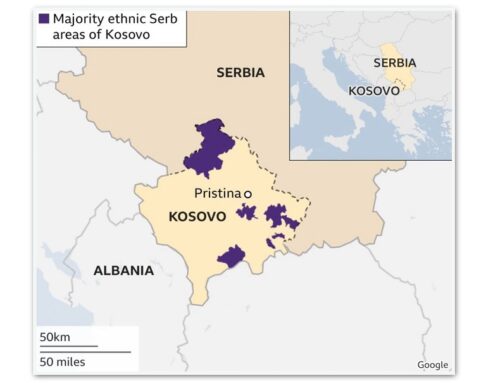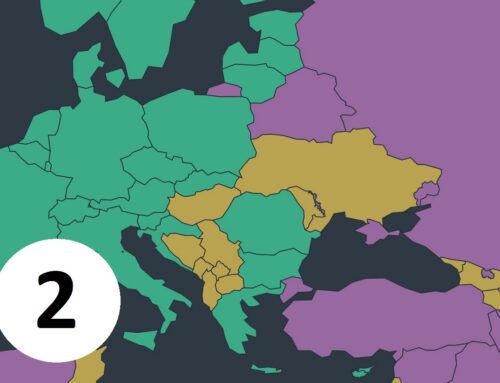The recent school shooting case in Belgrade, the capital of Serbia, has been a tragic event that has shocked the nation and the world. The incident happened on May 3rd, 2023, when a 13-year-old student opened fire on his classmates, killing eight and injuring several others. Unfortunately, this was followed by another mas shooting in villages south of Belgrade the following day, killing eight and injuring 14 others. These incidents have once again brought to light the issue of gun violence and mental health in schools, as well as the question of how to hold perpetrators accountable for their actions, which is why through this article I’ll be analysing this case from a legal perspective, focusing on how the positive law will be implemented in this situation while highlighting the shortcomings of the European legal system and raising the question of whether adopting the Anglo-Saxon legal system could better serve justice in Europe.
Starting with some legal background, Serbia uses the European legal system, which is based on civil law principles. This means that the law relies on codified statutes and judges are expected to apply the law as it is written without much room for interpretation. Aristotle seems to agree when he writes “The best regime is not one based on written laws” (1286a). While these principles tend to have its benefits, it also tends to be more rigid and less flexible than common law systems.
In contrast, the Anglo-Saxon legal system is based on common law principles, emphasizes the role of judges in interpreting and applying the law, with judicial precedent being the primary source of law. This gives judges more discretion in determining the appropriate sentence for a particular crime, taking into account the circumstances of the case and the offender’s background. In this case, adopting an Anglo-Saxon legal system could lead to a more nuanced and individualized approach to justice.
One challenge in this case is the age of the perpetrator. The boy is only 13 years old, which means that he cannot be criminally prosecuted under the Serbian positive law, which states that the criminal responsibility is acquired at the age of 14. That is just part of the reason why, especially in cases like this, an Anglo-Saxon legal system could lead to a more just punishment, since it would allow the judges to craft a sentence that took into account both the seriousness of the offense and the potential for rehabilitation and reform.
The Serbian government has introduced a set of measures in order to prevent potential violence in school, which include tighter gun control laws, as well as increased police presence. Besides that, they’ve also tasked the justice ministry to change the legislation to lower the age for criminal punishment to 12 (from the current 14) years old. But none of that can affect this case as it contradicts the principle of legality, which contains the prohibition of retroactive application of the criminal law (nulla poena sine lege praevia). This means that there is no criminal act and no criminal sanction if it was not prescribed by the criminal law before the criminal act was committed. Therefore, it remains uncertain what charges the 13-year-old boy will face.
A social law specialist, Dragan Vulević, has suggested three possible actions after the case is taken over by the Centre for Social Work. The first option is further hospitalization, which requires parental consent. If the parents do not consent, the guardianship authority can start the procedure for adopting a temporary measure on the deprivation of parental rights and appoint a temporary guardian for the child. Another possible option is to release him and place him in an institution for children with behavioural disorders, requiring parental consent. If the parents do not consent, the procedure for adopting a measure on the deprivation of parental rights goes again. The third possibility is that the medical team can say that no treatment is needed, and the boy is returned to his family, requiring the guardianship authority to draw up a detailed plan of support for the parents in raising the child.
As for the responsibility of the parents, if the qualification is a serious crime against general safety from Article 288, and in relation to Article 278 of the Criminal Code which states that “whoever acquires, possesses, uses, transports, gives nuclear materials to others or enables others to obtain them, by force or threat, by committing a criminal offense or in another illegal way…”, the prison sentence can be up to 12 years – lawyer Nikola Ilić explained.
In conclusion, the recent school shooting case in Serbia underscores the need for effective legal systems that can hold perpetrators accountable, regardless of their age. While the question of whether adopting the Anglo-Saxon legal system would benefit Europe and be more just than the European legal system is complex and contentious, it is up to policymakers and legal experts to determine the best way forward.
Resources:
CNN – “Serbia school shooting: Three dead, several injured in Belgrade suburb” –https://edition.cnn.com/2023/05/03/europe/serbia-school-shooting-intl/index.html
CNN – “Serbia school shooting: What we know” – https://edition.cnn.com/2023/05/03/europe/serbia-school-shooting-what-we-know-intl/index.html
BBC News – “Serbia school shooting: Gunman ‘planned attack for months’” – https://www.bbc.com/news/world-europe-65468404
BBC News – “Serbia school shooting: Kosta Kecmanovic charged with murder” – https://www.bbc.com/news/world-europe-65490418
Associated Press – “Serbia school shooting: Suspect was expelled student” – https://apnews.com/article/serbia-shootings-belgrade-mladenovac-guns-2e7d1ccb3c2bca32331f12bb29efe7f1
Reuters – “Serbia takes steps to prevent school violence after shooting” – https://www.reuters.com/world/europe/serbia-takes-steps-prevent-school-violence-after-shooting-2023-05-04/
Blic – “UŽIVO: Pucnjava u školi ispred OŠ ‘Vladislav Ribnikar’, skupio se skoro ceo Beograd” – https://www.blic.rs/vesti/hronika/uzivo-pucnjava-u-skoli-ispred-os-vladislav-ribnikar-se-skupio-skoro-ceo-beograd/v0t0s3n
Republika – “Kosta Kecmanović: Odgovornost dalja sudbina” – https://www.republika.rs/hronika/hronika/432323/kosta-kecmanovic-odgovornost-dalja-sudbina
Blic – “Pucnjava u školi: Evo kakva kazna čeka Kostu Kecmanovića” – https://www.blic.rs/vesti/hronika/pucnjava-u-skoli-evo-kakva-kazna-ceka-kostu-kecmanovica/2y984lj
Blic – “Pretraga Koste Kecmanovića potvrđuje da je planirao pucnjavu u školi ‘Vladislav Ribnikar’?” – https://www.blic.rs/vesti/hronika/pretraga-koste-kecmanovica-potvrduje-da-je-planirao-pucnjavu-u-skoli-vladislav/mfl7ddq
Blic – “Pucnjava u školi: Evo kakva kazna čeka Kostu Kecmanovića” – https://www.blic.rs/vesti/beograd/pucnjava-u-skoli-evo-kakva-kazna-ceka-kostu-kecmanovica/91dz2cf
Krivični Zakonik Srbije (“Sl. glasnik RS”, br. 85/2005, 88/2005 – ispr., 107/2005 – ispr., 72/2009, 111/2009, 121/2012, 104/2013, 108/2014, 94/2016 i 35/2019)
https://www.slobodnaevropa.org/a/skola-pucnjava-beograd/32392792.html
Krivično Pravo : Opšti Deo – Zoran Stojanović (26. dopunjeno izd. – Beograd: Pravna knjiga, 2019)
Uvod u Jurisprudenciju : osnovi teorije prava – Budimir P. Košutić (Podgorica: Biblioteka Universitas/CID, 2008)


